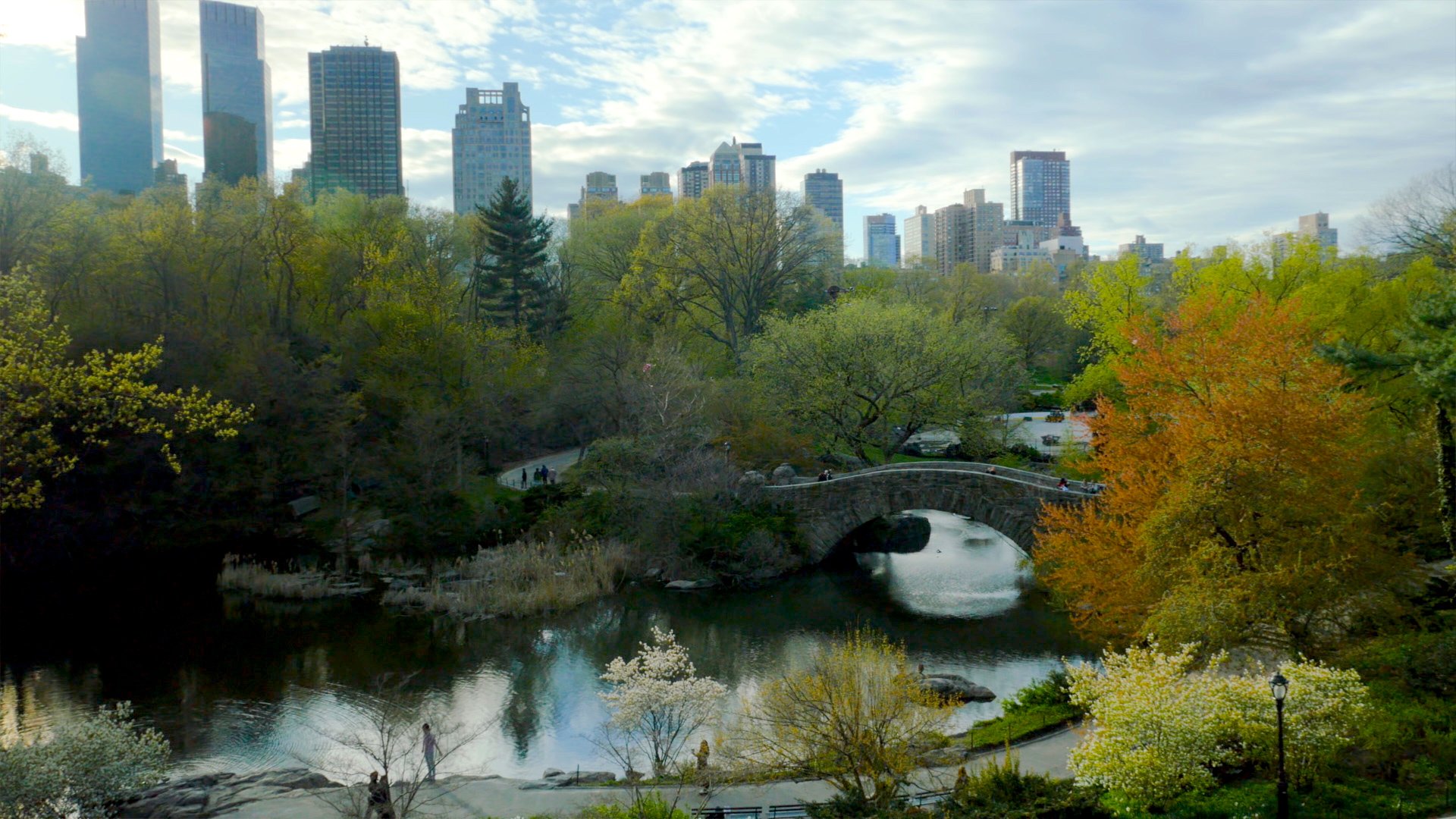Most of us think of George Washington as the Revolutionary War General and first U.S. President. But what many don't know is that he also loved nature, farming and gardening. In this episode we meet Dean Norton, head horticulturalist at Mount Vernon. Listen as Norton guides us back in time to Washington's home and describes the groundbreaking array of vegetable and pleasure gardens Washington created to serve both practical and decorative functions around the historic grounds.
Episode 27: Angela Fanning - Homesteader
After having her first child, Angela Fanning quit her job running her own graphic design business to pursue a life lived outdoors, aligned with the seasons and with nature. In this episode of Nature Revisited, Angela describes her fulfilling journey to self-sufficiency, starting with growing and preserving her own homegrown produce to transitioning with her family into a bustling farm with horses, geese, ducks, an apiary, and a small orchard.
Episode 26: Death Valley - A Conversation with Clint Augustson
Clint Augustson is a National Parks Ranger who has worked in various parks across the United States, including Mendenhall Glacier & Katmai National Parks in Alaska, The Grand Canyon in Arizona, and now Death Valley in Eastern California. In this episode of Nature Revisited, Clint describes the relationship between Death Valley’s geography and its desert climate, the varieties of life that are able to survive there, and the impact of climate change as a result of the interconnectedness of nature.
Episode 25: Daniel Berthold - The Philosophy in Nature
Daniel Berthold is a Professor of Philosophy at Bard College, specializing in 19th and 20th century continental philosophy, environmental ethics, and phenomenology & existentialism. In this episode of Nature Revisited, Daniel discusses the concept of philosophy in nature: how philosophers of the past have shaped our perception of it and how we can apply philosophy towards a more meaningful, balanced relationship with nature.
Episode 24: The Davises - A Homegrown National Park
In his book Nature's Best Hope, Doug Tallamy lays out a new approach to conservation that everyone can employ at home in their own yards. Inspired by this idea, James & Taylor Davis embarked upon a journey to transform their small New Hampshire yard into a haven for native plant species, which in turn nurture the native fauna. In this episode of Nature Revisited, the Davises share their experiences cultivating native plant species and challenge the notion of what home gardens can and should be.
Episode 23: Paul Fuzinski - The Appalachian Trail
The Appalachian trail is an iconic American landmark of wild natural beauty and the longest hiking-only trail in the world, stretching from Georgia to Maine. More than 2 million people hike portions of the trail each year, but only a small fraction hike the entirety of the trail in a single season. Paul Fuzinski is one such ‘Thru-hiker’. On this episode of Nature Revisited, Paul recounts his life-changing experiences on the trail, the physical and mental commitments involved, relationships forged along the way, and the resulting profound connection to nature he now enjoys.
Listen to Paul's podcast Aptitude Outdoors
Episode 22: Jay Parini - The Poet’s Nature
Jay Parini is an American writer known for his poetry, novels, biography, screenplays, and criticism. Since before scientific knowledge of the natural world became widespread, poets have been examining man's connection to nature using 'language adequate to experience'. In this episode, Jay describes how the voice of the poet is more relevant than ever during a time when the pressing ailments of the world are directly related to the growing divide between man and nature.
Episode 21: James Faupel - An Urban Ecologist
James Faupel specializes in Restoration Ecology at the Litzinger Road Ecology Center (LREC), a division of the Missouri Botanical Gardens in St Louis, MO. With a background in horticulture and arboriculture, James is part of a growing movement championing the ecological benefits of cultivating native plant species. In this episode, James discusses his personal path to the ecological world and explains the importance of native plant species in counterpoint to the destructive effects of foreign invasive species, which often go unnoticed or unchecked.
Episode 20: Philadelphia’s Victory Gardens
During WWI and WWII, Victory Gardens were a part of daily life on the home front in many countries. Planted in both private residences and public parks, Victory Gardens were vegetable, fruit and herb gardens meant to reduce pressure on the public food supply. In this episode, Stefan van Norden and Sean Clauson visit the Victory Gardens in Philadelphia, PA and talk with some of its members about what and why they garden, and the benefits that go with it.
Stefan van Norden at the Victory Gardens entrance
Episode 19: Joan Edwards - Pollinators • Nature's First Responders
Joan Edwards is a Professor of Biology at Williams College where her research focuses on the evolution of plant-animal interactions—flower-pollinator associations and plant-herbivore interactions. In this episode, Joan talks about the fundamental role pollinators play not only in the production of humanity's food crops, but in maintaining the earth's biodiversity. She also recounts her personal path of discovery and love of biology & botany, and illuminates some surprising connections we share with pollinators of all kinds.
Episode 18: Negotiating with Nature - The Film
Part 1 - To celebrate one year of Nature Revisited, we return to the podcast's roots: Negotiating with Nature - The Film. Listen to Part 1 of an audio version of the compelling and deeply human documentary that examines how the widening disconnect with nature is shaping our lives from many perspectives.
Part 2 - Listen to Part 2 of an audio version of Negotiating with Nature - The Film. Featuring iconic American landmarks like Central Park, The High Line, and Mount Vernon Estate, the film journeys from country to city to unearth “resonant inter-connections between a person and the land”.
Episode 17: Dan Barmore - On the Road
There's something to be said for cruising down the open road, taking in the sights and smells with the sun on your face, and two wheels between you and the ground. In this episode Stefan talks with his co-worker Dan Barmore, who finds freedom, meaning and a connection to nature while on the road.
Episode 16: The Experience of Place - Mitchell Silver & New York City's Parks
Mitchell Silver on the roof of The Arsenal, Central Park. Photo by Michelle Young
The notion of what our city's parks can and should be has been undergoing a dramatic makeover in recent years, and New York City is leading by example. NYC Parks Commissioner Mitchell J.Silver has over 30 years experience in planning and is internationally recognized for his contributions to contemporary planning issues. In this episode Mitchell discusses the comprehensive planning, place making and implementation strategies he has put forth to both modernize existing NYC parks as well as reclaim & transform post-industrial sites into new playgrounds, beaches and wilderness areas.
Central Park NYC
Episode 15: Doug Tallamy - Nature's Best Hope
Humans have destroyed natural habitat in so many places that local extinction is rampant and global extinction accelerating. This is a growing problem because it is the ecosystems around us that support us. Doug Tallamy is a professor of Entomology and Wildlife Ecology at the University of Delaware, where he studies the many ways insects interact with plants and how such interactions determine the diversity of animal communities. His new book, Nature's Best Hope, lays out a new approach to conservation that everyone can employ at home in their own yards.
Episode 14: Dan Snow - In The Company of Stone
Dan Snow is an assemblage artist specializing in site-generated, or locally sourced, natural materials. His dry stone constructions include a wide variety of functional as well as artistic sculptural works which fuse vanguard vision with old world techniques and traditions. In this episode, Dan recounts his path to becoming an artist, the philosophy behind his work, and the co-founding of The Stone Trust- a southern Vermont educational center preserving the craft of dry stone walling.

























